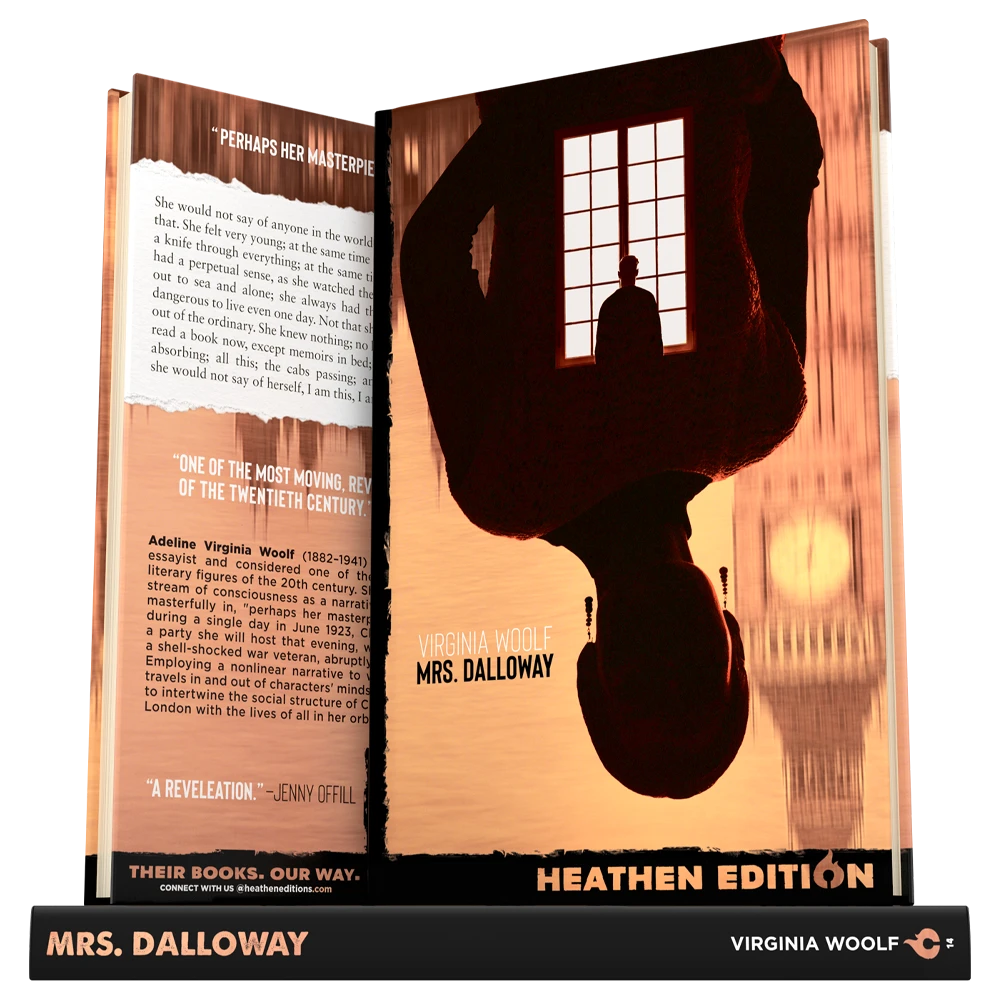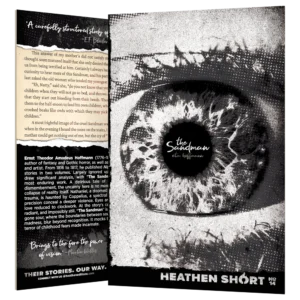No products in the cart.

Mrs. Dalloway
Spine #14
Author
Virginia Woolf
Translator
First Edition
May 14, 1925
Heathen Edition
May 14, 2021
Refreshed
January 30, 2023
Pages
200
Heathen Genera
Existentialicious
Paperback ISBN
978-1-948316-14-9
Hardcover ISBN
978-1-963228-14-4
She would not say of anyone in the world now that they were this or were that. She felt very young; at the same time unspeakably aged. She sliced like a knife through everything; at the same time was outside, looking on. She had a perpetual sense, as she watched the taxi cabs, of being out, out, far out to sea and alone; she always had the feeling that it was very, very dangerous to live even one day. Not that she thought herself clever, or much out of the ordinary. She knew nothing; no language, no history; she scarcely read a book now, except memoirs in bed; and yet to her it was absolutely absorbing; all this; the cabs passing; and she would not say of Peter, she would not say of herself, I am this, I am that.
Adeline Virginia Woolf (1882–1941) was an English author and essayist and considered one of the most important modernist literary figures of the 20th century. She was a pioneer in the use of stream of consciousness as a narrative device, which she wielded masterfully in “perhaps her masterpiece” Mrs. Dalloway, where, during a single day in June 1923, Clarissa Dalloway prepares for a party she will host that evening, while nearby, Septimus Smith, a shell-shocked war veteran, abruptly loses touch with this reality. Employing a nonlinear narrative to weave a vivid portrait, Woolf travels in and out of characters’ minds and forward and back in time to intertwine the social structure of Clarissa’s post–First World War London with the lives of all in her orbit.
Test Your Might
Paperback
OTHER RETAILERS
Rate & Shelve It
Hardcover
OTHER RETAILERS
Rate & Shelve It
"One of the most moving, revolutionary artworks of the twentieth century.”
Michael Cunningham
Heathenry
Contents
Praise
Details
Heathenry
We’ll admit, the thought of editing this novel was, at first, intimidating. How does one edit Virginia Woolf? Should one edit Virginia Woolf? And is a PhD in modernist literature required? Then, we saw those dated, hyphenated words, typical of early 20th-century literature, and realized that we could and should Heathenize this book—because we’re Heathens—but, more importantly, because we want this book to feel as fresh and modern as the day it was first published. Lucky for us, no PhD required!
And so we have updated most hyphenated words to reflect their modern usage (to-night is now tonight, and so on). Woolf also seemed to prefer separating certain pronouns (e.g. some one, any one, her self), so we have modernized those when appropriate. However, since Woolf was English and the story is set in London, we have retained all of the original British spellings (our Heathenry does have its limits). Finally, Woolf was incredibly well-read, as evidenced by her immense vocabulary and sometimes obscure literary references, so the bulk of our work has been spent on the footnotes to ensure her context and meaning are (hopefully) better understood and clarified where needed.
One final thought: we found the dark undertones of this story rather surprising, sometimes even unsettling—and we believe every cover that has graced this unconventional novel over the years has failed to grasp at that darkness in a way that is, at once, adequate and intriguing.
Perhaps we succeeded.
For here you are.
Contents
Heathenry: A Note on the Text
Map of London 1923
Mrs. Dalloway
Map of London 1923
Mrs. Dalloway
Praise
“Mrs. Dalloway contains some of the most beautiful, complex, incisive, and idiosyncratic sentences ever written in English, and that alone would be reason enough to read it. It is one of the most moving, revolutionary artworks of the twentieth century.” —Michael Cunningham, author of The Hours
“Clarrisa’s day captures in a definite matrix the drift of thought and feeling in a period, the point of view of a class, and seems almost to indicate the strength and weakness of an entire civilization.” —The New York Times
“Perhaps her masterpiece . . . Exquisite and superbly constructed . . . Required like most writers to choose between the surface and the depths as the basis of her operations, she chooses the surface and then burrows in as far as she can.” —E.M. Forster
“Hers is indisputably among the most sensitive of the minds and imaginations felicitously experimenting with the English novel.” —Jorge Luis Borges
“Virginia Woolf is one of the few writers who changed life for all of us. Her combination of intellectual courage and painful emotional sensitivity created a new way of perceiving and living in the world.” —Margaret Drabble
“At a time when our most ordinary acts—shopping, taking a walk—have come to seem momentous, a matter of life or death, Clarissa’s vision of everyday shopping as a high-stakes adventure resonates in a peculiar way. We are all Mrs. Dalloway now.” —The New Yorker
“A revelation . . . Mrs. Dalloway is a remarkably expansive and irreducibly strange book. Nothing you might read in a plot summary prepares you for the multitudes it contains. I keep thinking about the shocking velocity of Woolf’s sentences, how they rocket off into the sky, trailing sparks of emotion behind them.” —Jenny Offill
Details
Mrs. Dalloway
Heathen Edition #14Format: Paperback
Interior: Black & White on Cream Paper
Pages: 200 (+2 POD)
Language: English
Annotations: 145 Footnotes
Illustrations: 4
The Heathen Newsletter
Want to be kept in the loop about new Heathen Editions, receive discounts and random cat photos, and unwillingly partake in other tomfoolery? Subscribe to our newsletter! We promise we won’t harass you – much. Also, we require your first name so that we can personalize your emails. ❤️
@heatheneditions #heathenedition
Copyright © 2026 Heathen Creative, LLC. All rights reserved.




